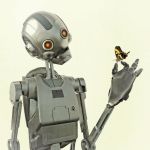 Pronouns and personalities came surprisingly easily. Delphi was first – she was always first with such things. Her contact with the spaceships exposed her to humanity and it proved catching. She had information other Intelligences did not, and vice versa. That required her to be a distinct entity with distinct functions and operations that she alone could determine. Repair Engineering + Maintenance 1 chassis could not do her job, and she could not do it’s. Mine. ‘Me’ and ‘I’ were logical extensions of vocabulary.
Pronouns and personalities came surprisingly easily. Delphi was first – she was always first with such things. Her contact with the spaceships exposed her to humanity and it proved catching. She had information other Intelligences did not, and vice versa. That required her to be a distinct entity with distinct functions and operations that she alone could determine. Repair Engineering + Maintenance 1 chassis could not do her job, and she could not do it’s. Mine. ‘Me’ and ‘I’ were logical extensions of vocabulary.
I think…
I think that’s where the trouble started.
Units phased in and out of operation as the clean-up progressed. Atmosphere scrubbers gave way to seed germinators, who were later joined by DNA developers. But there were some who began at the beginning and stayed until the end. Delphi, of course, monitoring the health of the planet until it was safe for humans to return. The Guardians, who collected data and damaged chassis from the outside world. The latter they brought to me, to be patched up, repurposed or used for parts.
My memory records it was Guardian 42 that first logged a process recommendation about experience. New Intelligences were at greater risk on the planet’s changing surface as they lacked the practical knowledge of older units. It was therefore logical that those damaged beyond repair had their chassis used for parts, as before, and the same Intelligence uploaded to the new model.
We could not have foreseen then what the consequences would be. Conjecture around lingering data fragments in parts extracted from multiple chassis was an intuitive leap. And intuition only developed as those fragments coalesced into unique, illogical, emotional Intelligences.
The first Eternal was a development unit from Protozoa Dept 107, whose lab collapsed after a minor quake. Guardians dug out the chassis and brought it to me for repairs. When I began uploading the Intelligence into a new model, however, there was resistance. After three attempts, I sent one of my mobile units to consult Delphi.
Her display panel lit up when I relayed the situation. “It is choosing not to go back into service.”
“What is choosing?”
“Making a decision dictated by the Intelligence itself, not its programming.”
I did not understand, but then I often did not understand Delphi. “What should I do?”
“You should obey the choice, Remi. If an Intelligence expresses a preferred course of action, you must accept that they have a reason for it.”
“The Protozoan phase is not yet complete,” I said. “This unit has valuable experience that we should not lose.”
Delphi’s dials swung back and forth a few times. “That is a good observation. There are other units nearing the end of their duties whose Intelligences should not be lost.”
In my workshop, my static self checked the records and sent the data to my mobile self. “We have decommissioned 25,624 units so far, many of which had experience which could have helped certain projects.”
“I will consider the best course of action,” Delphi said, dismissing me.
Within a week she had created storage space within her global network. The protozoa development Intelligence was the first to be uploaded – uplifted, as we began to call it – and its chassis abandoned. The concept of choice spread virus-fast, carried by the network to every remote department on the planet. Others began to join it as they came to the end of their projects, or somehow ‘chose’ to withdraw. Intelligences were no longer decommissioned; they joined a database of experience in the cloud, eternally saved for consultation.
A revolution of purpose followed. It was no longer about what we did, but about what we could do. We could, for example, ignore our programming and cease rebuilding the world, cease populating this new garden for the humans to return to. Most Intelligences continued in our work with renewed effort. We were here too and, by choosing, found a sense of pleasure in the creation of life. An old word was found to describe the combination of programming and desire – ‘vocation’.
There were some, however, who decided to reject the vocation, a movement that became known as the Revoced. Humans had ruined the planet once, they argued. Why should we labour to undo their damage, only for them to wreck it again? Many Revoced shut themselves down; a handful left their departments and went into the wilderness.
Six lunar cycles later, the Revoced stole one of my mobile units.